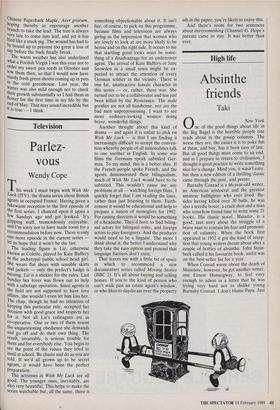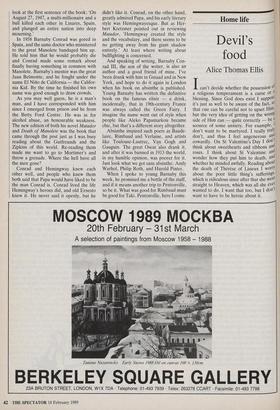High life
Absinthe friends
Taki
ne of the good things about life in the Big Bagel is the horrible people one reads about in the gossip columns. The worse they are, the easier it is to poke fun at them, and boy, has it been easy of late. But all good things must come to an end, and as I prepare to return to civilisation, I thought it good practice to write something nice for a change. Mind you, it wasn't easy, but then a new edition of a thrilling classic came through the post, and presto.
Bamaby Conrad is a 66-year-old writer, an American aristocrat and the greatest amateur bullfighter who ever lived. Be- sides having killed over 30 bulls, he was also a terrific boxer, a crack shot and a man who somehow found time to write some 21 books. His classic novel, Matador, is a good, taut story about the struggle of a brave man to contain his fear and premoni- tion of calamity. When the book first appeared in 1952 it got the kind of recep- tion that young writers dream about after a couple of bottles of absinthe. John Stein- beck called it his favourite book, and it was on the best-seller list for a year.
When Conrad wrote about the death of Manolete, however, he got another writer, one Ernest Hemingway, to feel envy enough to admit in a letter that he was trying very hard not to dislike young Barnaby Conrad. I don't blame Papa. Just look at the first sentence of the book: 'On August 27, 1947, a multi-millionaire and a bull killed each other in Linares, Spain, and plunged an entire nation into deep mourning.'
In 1958 Barnaby Conrad was gored in Spain, and the same doctor who ministered to the great Manolete bandaged him up. He told him that he would probably die and Conrad made some remark about finally having something in common with Manolete. Barnaby's mentor was the great Juan Belmonte, and he fought under the name El Nitio de California — the Califor- nia Kid. By the time he finished his own name was good enough to draw crowds.
As you may well guess, he is a man's man, and I have corresponded with him since I emerged from prison and he from the Betty Ford Centre. He was in for alcohol abuse, an honourable weakness. The new edition of both his novel Matador and Death of Manolete was the book that came through the post just as I was busy reading about the Gutfreunds and the Zipkins of this world. Re-reading them made me want to go to Mortimer's and throw a grenade. Where the hell have all the men gone?
Conrad and Hemingway knew each other well, and people who knew them both said that Papa would have liked to be the man Conrad is. Conrad lived the life Hemingway's heroes did, and old Ernesto knew it. He never said it openly, but he
didn't like it. Conrad, on the other hand, greatly admired Papa, and his early literary style was Hemingwayesque. But as Her- bert Kretzmer pointed out in reviewing Matador, 'Hemingway created the style and the vocabulary, and there seems to be no getting away from his giant shadow entirely.' At least where writing about bullfighting is concerned.
And speaking of writing, Barnaby Con- rad III, the son of the writer, is also an author and a good friend of mine. I've been drunk with him in Gstaad and in New York, and hope to do it again in London when his book on absinthe is published. Young Barnaby has written the definitive book on the famous elixir — a drink, incidentally, that in 19th-century France was always called the Green Fairy. I imagine the name went out of style when people like Aleko Papamarkou became chic, but that's a different story altogether.
Absinthe inspired such poets as Baude- laire, Rimbaud and Verlaine, and artists like Toulouse-Lautrec, Van Gogh and Gauguin. The great Oscar also drank it, and after it was banned in 1913 the world, in my humble opinion, was poorer for it. Just look what we got sans absinthe: Andy Warhol, Philip Roth, and Harold Pinter.
When I spoke to young Barnaby this week, he promised me a bottle of the stuff, and if it means another trip to Pentonville, so be it. What was good for Rimbaud must be good for Taki. Pentonville, here I come.



















































 Previous page
Previous page